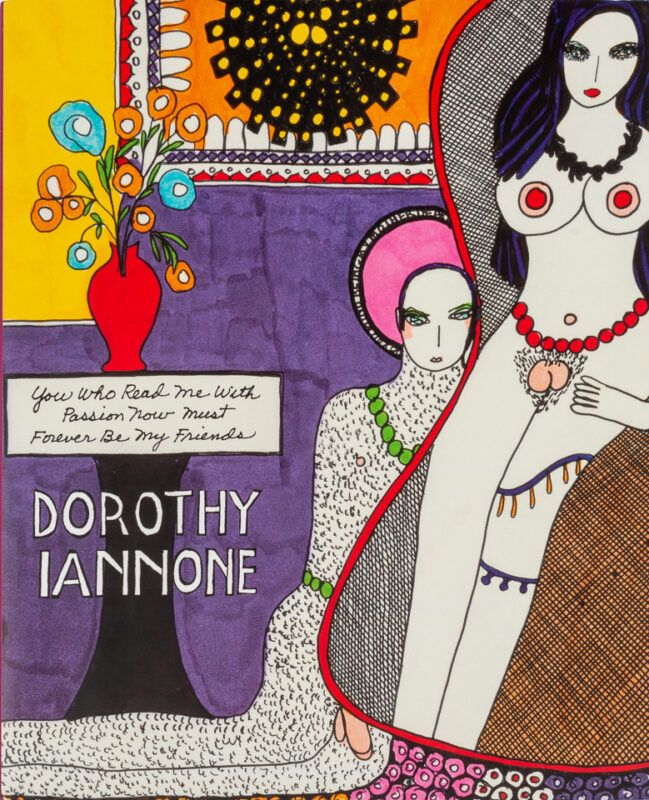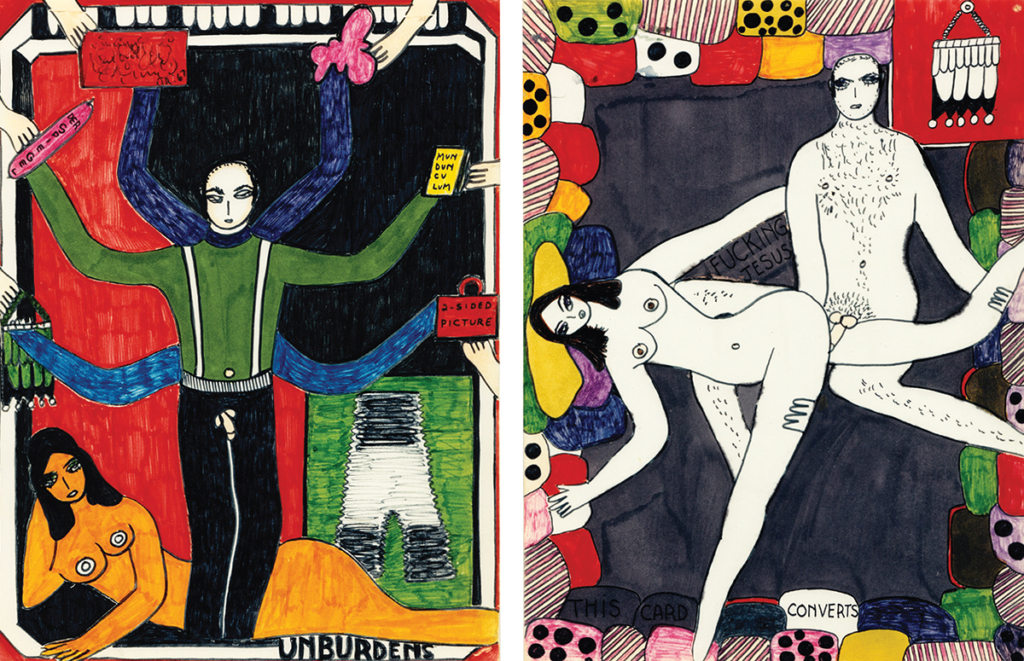Dorothy Iannone, a short biographyLisa Pearson
excerpts, 10/31/14

Portrait of Dorothy Iannone by her husband James Upham, Kyoto, 1962
artist biography
Dorothy Iannone (b. 1933, Boston, MA) is best known for her exuberantly transgressive, sexually explicit, mostly autobiographical image+text works exploring “ecstatic unity.” She has been making artist’s books, paintings, drawings, sculptures, sound pieces and video installations in relative obscurity since the 1960s until The Wrong Gallery featured her work at the Tate Modern in 2005, followed by inclusion in The Whitney Biennial in 2006 with the work “I Was Thinking Of You,” (1975/2005) colloquially known as “the orgasm box.” Her first solo exhibition at a U.S. museum, “Dorothy Iannone: Lioness,” took place in 2009 at the New Museum in New York.
Raised by her Catholic mother Sarah Pucci in a multi-generational Italian-American household, Iannone completed her undergraduate degree in American Literature at Boston University in 1957. Soon thereafter, she pursued graduate studies at Brandeis University and received a fellowship to pursue her Phd at Stanford University but chose to stay on the East Coast to marry the painter and investor James Upham. Together, they traveled extensively throughout Europe, North Africa and Asia which had a lasting and profound influence on her art. Returning from a trip abroad, U.S. Customs seized her copy of Henry Miller’s Tropic of Cancer, designating it obscene. She sued for its return and won, lifting the ban on Miller’s work not knowing that she would later fight (and sometimes lose) battles over the censorship of her own work.
Self-taught, Iannone began painting large-scale abstract works in 1959 into which she later began integrating texts by writers such as Wallace Stevens, William Butler Yeats and Gerard Manley Hopkins. By 1966, she was making more figurative works: hundreds of “People,” small, flat wood sculptures of beloved actors, writers, mythic and historic figures who, while clothed, had drawn-on genitals. Often deemed pornographic by the authorities but vehemently defended by curators and fellow artists, the “People”—as well as later works—were censored, sometimes even confiscated and destroyed.
With Upham, Iannone founded the Stryke Gallery in 1963, and she was not only involved with the downtown art scene in New York City but also began cultivating lifelong friendships with European and American ex-pat artists such as Robert Filliou and George Brecht. In 1967, Iannone and Upham traveled with Fluxus poet and artist Emmett Williams on a freighter to Iceland to visit the artist Dieter Roth who was living in Reykjavík. As narrated in An Icelandic Saga, (one of her best known works and “a ‘Dear John’ letter recast as a Norse myth,” according to the New York Times), Iannone left Upham to embark on a new life with Roth with whom she spent the next seven years and who served as her muse. Their relationship—in all its sexual, emotional, creative and quotidian aspects—served as material and inspiration for her work, exploring sexual liberation and spiritual realization in a very different but no less radical way than her feminist contemporaries. Iannone moved from Reykjavík to live in London, Basel and Düsseldorf with Roth before their relationship ended in 1974.
Iannone moved to Berlin in 1976 (where she still lives today*) when she received a prestigious Berlin Artists-in-Residence fellowship from the DAAD. Persisting through economic hardship and intermittent exhibition opportunities, Iannone steadily began earning more recognition, particularly in Germany and France. Other factors in her life at this time also deeply affected her art work: in 1985, she began her study and practice of Tibetan Buddhism, and later in the 1990s, Iannone spent time caring for her ailing mother who died in 1996. With burgeoning international recognition in 2005 and 2006, Iannone’s work has now been discovered by younger generations of artists, writers, curators and critics. Her most recent solo exhibitions include “Innocent and Aware” at the Camden Arts Centre, London, and “Imperturbable” at the Centre National Édition Art Image, Paris, both in 2013, as well as another solo show at the Migros Museum für Gegenwartskunst, Zürich, and “This Sweetness Outside of Time,” a major retrospective at the Berlinische Galerie für Moderne Kunst, Berlin, in 2014.
*This biography was written in 2014 for the publication of You Who Read Me With Passion Now Must Forever Be My Friends. Since then, Iannone has had several exhibitions, most recently at the Louisiana Museum in Denmark, and publications including facsimiles of her artists books, A Cookbook and The Story of Bern. Her renderings of the Statue of Liberty have appeared as a commissioned mural for the Highline in New York City and as beaded figures adorning the Lady Dior handbag. In her last decade, Iannone achieved the recognition and admiration that had eluded her for most of her life. Read obituaries in Artforum, The Art Newspaper, and ARTNews.
Biography published in You Who Read Me With Passion Now Must Forever Be My Friends by Dorothy Iannone, edited by Lisa Pearson. All rights reserved. © 2014 Lisa Pearson and Siglio Press.

“The Statue Of Liberty,” 1977, color silkscreen on paper. 32.75 x 23.5 in. Published by Studio Galerie, Mike Steiner, Berlin. Edition of 100.
see also
✼ natalie’s upstate weather report:
august 27, 2024—Oh, the chasm of meta. First, hackers hacked the original @sigliopress. As we refused to pay the ransom and meta was zero to nothing with help, @sigliopress disappeared into the abyss. A brief attempt at another—@sigliopress_affinities—was deemed “inauthentic” and taken down by meta, with none of the recourse supposedly on offer actually available. What now? Who knows. The point is…? Alas.
[...]

